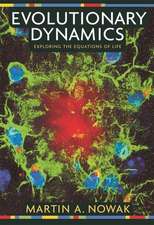Principles of Evolution: From the Planck Epoch to Complex Multicellular Life: The Frontiers Collection
Editat de Hildegard Meyer-Ortmanns, Stefan Thurneren Limba Engleză Paperback – 15 iul 2013
| Toate formatele și edițiile | Preț | Express |
|---|---|---|
| Paperback (1) | 494.32 lei 6-8 săpt. | |
| Springer Berlin, Heidelberg – 15 iul 2013 | 494.32 lei 6-8 săpt. | |
| Hardback (1) | 500.84 lei 6-8 săpt. | |
| Springer Berlin, Heidelberg – 2 mai 2011 | 500.84 lei 6-8 săpt. |
Din seria The Frontiers Collection
-
 Preț: 298.66 lei
Preț: 298.66 lei -
 Preț: 351.90 lei
Preț: 351.90 lei -
 Preț: 297.61 lei
Preț: 297.61 lei - 17%
 Preț: 366.24 lei
Preț: 366.24 lei - 8%
 Preț: 462.91 lei
Preț: 462.91 lei -
 Preț: 308.36 lei
Preț: 308.36 lei -
 Preț: 395.47 lei
Preț: 395.47 lei -
 Preț: 323.05 lei
Preț: 323.05 lei -
 Preț: 215.30 lei
Preț: 215.30 lei -
 Preț: 312.94 lei
Preț: 312.94 lei - 17%
 Preț: 493.43 lei
Preț: 493.43 lei -
 Preț: 381.15 lei
Preț: 381.15 lei -
 Preț: 271.81 lei
Preț: 271.81 lei -
 Preț: 396.40 lei
Preț: 396.40 lei -
 Preț: 208.95 lei
Preț: 208.95 lei - 17%
 Preț: 525.37 lei
Preț: 525.37 lei - 20%
 Preț: 340.49 lei
Preț: 340.49 lei -
 Preț: 225.86 lei
Preț: 225.86 lei -
 Preț: 283.50 lei
Preț: 283.50 lei -
 Preț: 346.61 lei
Preț: 346.61 lei -
 Preț: 270.72 lei
Preț: 270.72 lei - 15%
 Preț: 536.96 lei
Preț: 536.96 lei - 5%
 Preț: 383.93 lei
Preț: 383.93 lei -
 Preț: 500.84 lei
Preț: 500.84 lei -
 Preț: 484.69 lei
Preț: 484.69 lei - 15%
 Preț: 590.16 lei
Preț: 590.16 lei - 15%
 Preț: 534.82 lei
Preț: 534.82 lei - 15%
 Preț: 481.34 lei
Preț: 481.34 lei - 15%
 Preț: 640.24 lei
Preț: 640.24 lei -
 Preț: 401.79 lei
Preț: 401.79 lei - 15%
 Preț: 595.68 lei
Preț: 595.68 lei -
 Preț: 388.34 lei
Preț: 388.34 lei -
 Preț: 390.63 lei
Preț: 390.63 lei - 15%
 Preț: 478.05 lei
Preț: 478.05 lei - 15%
 Preț: 475.15 lei
Preț: 475.15 lei - 15%
 Preț: 534.36 lei
Preț: 534.36 lei -
 Preț: 389.49 lei
Preț: 389.49 lei -
 Preț: 493.85 lei
Preț: 493.85 lei -
 Preț: 394.29 lei
Preț: 394.29 lei -
 Preț: 459.92 lei
Preț: 459.92 lei
Preț: 494.32 lei
Nou
Puncte Express: 741
Preț estimativ în valută:
94.60€ • 102.72$ • 79.46£
94.60€ • 102.72$ • 79.46£
Carte tipărită la comandă
Livrare economică 22 aprilie-06 mai
Preluare comenzi: 021 569.72.76
Specificații
ISBN-13: 9783642268021
ISBN-10: 3642268021
Pagini: 400
Ilustrații: XII, 388 p.
Dimensiuni: 155 x 235 x 25 mm
Greutate: 0.57 kg
Ediția:2011
Editura: Springer Berlin, Heidelberg
Colecția Springer
Seria The Frontiers Collection
Locul publicării:Berlin, Heidelberg, Germany
ISBN-10: 3642268021
Pagini: 400
Ilustrații: XII, 388 p.
Dimensiuni: 155 x 235 x 25 mm
Greutate: 0.57 kg
Ediția:2011
Editura: Springer Berlin, Heidelberg
Colecția Springer
Seria The Frontiers Collection
Locul publicării:Berlin, Heidelberg, Germany
Public țintă
ResearchCuprins
Introduction.- Part I Principles of Evolution.- Physical Principles of Evolution.- The Interplay of Replication, Variation and Selection in the Dynamics of Evolving Populations.- A Simple General Model of Evolutionary Dynamics.- Can we Recognize an Innovation? Perspective from an Evolving Network Model.- Part II From Random to Complex Structures: The Concept of Self-Organization for Galaxies, Asters and Spindles.- How Stochastic Dynamics far from Equilibrium can Create Nonrandom Patterns.- Structure Formation in the Universe.- The Need for Quantum Cosmology.- Self-Organization in Cells.- Part III Protocells in Silico and In Vitro.- Approach of Complex-Systems Biology to Reproduction and Evolution.- Wet Artificial Life: The Construction of Artificial Living Systems.- Towards a Minimal System for Cell Division.- Part IV From Cells to Societies.- Bacterial Games.- Darwin and the Evolution of Human Cooperation.- Similarities Between Biological and Social Networks in their Structural Organization.- From Swarms to Societies: Origins of Social Organization.- Index.
Notă biografică
Hildegard Meyer-Ortmanns is full professor and head of the statistical physics group at Jacobs University in Bremen, Germany. Her area of expertise ranges from general relativity and theoretical particle physics to statistical physics and its applications to complex systems. Stefan Thurner is Professor of Science of Complex Systems at the Medical University of Vienna and external professor at the Santa Fe institute. His area of interest extends from theoretical physics and applied mathematics to complex systems theory and its applications in life science and economics.
Textul de pe ultima copertă
With contributions from a team of leading experts, this volume provides a comprehensive survey of recent achievements in our scientific understanding of evolution. The questions it asks concern the beginnings of the universe, the origin of life and the chances of its arising at all, the role of contingency, and the search for universal features in the plethora of evolutionary phenomena. Rather than oversimplified or premature answers, the chapters provide a clear picture of how these essential problems are being tackled, enabling the reader to understand current thinking and open questions. The tools employed stem from a range of disciplines including mathematics, physics, biochemistry and cell biology. Self-organization as an overarching concept is demonstrated in the most diverse areas: from galaxy formation in the universe to spindle and aster formation in the cell. Chemical master equations, population dynamics, and evolutionary game theory are presented as suitable frameworks for understanding the universal mechanisms and organizational principles observed in a wide range of living units, ranging from cells to societies. This book will provide engaging reading and food for thought for all those seeking a deeper understanding of the science of evolution.
Caracteristici
Displays the current view of science of evolution Presents a systematic interdisciplinary analysis of the development of life Discusses the evolution of social organizations Develops an interdisciplinary view of protein-and citation networks Gives examples for self-organized structures in the universe Includes supplementary material: sn.pub/extras

















